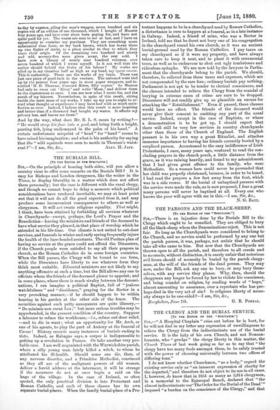THE BURIALS BILL.
(TO THE EDITOR OF TES SPECTATOR.)
the principle of hearing both sides, will you allow a country vicar to offer some remarks on the Burials Bill ? It is easy for Bishops and London clergymen, like the writer in the Times, to display liberality in a matter which does not affect them personally; but the case is different with the rural clergy, and though we cannot hope to delay a measure which political considerations have rendered inevitable, we may at least point out that it will not do all the good expected from it, and may produce some inconvenient consequences to others as well as clergymen. It will not create religions equality. That might, I think, have been attained by forbidding all services whatever in Churchyards—except, perhaps, the Lord's Prayer and the Benediction—leaving the ministers and friends of the deceased to have what service they pleased, in that place of worship which he attended in his life-time. Our climate is not suited to out-door services, and funerals in winter and early spring frequently injure the health of the bare-headed assistants. The old Puritan plan of having no service at the grave could not offend the Dissenters, if the Church people were satisfied to say all their prayers in church, as the Roman Catholics do in some foreign countries. When the Bill passes, the Clergy will be bound to one form, while the Dissenters have liberty to use whatever form they think most suitable. Educated ministers are not likely to say anything offensive at such a time, but the Bill allows any one to officiate whom the friends of the deceased please to appoint; and in some places, where there is much rivalry between the denomi- nations, I can imagine a political Baptist, full of "jealous watchfulness" and "dissidence," praying for the Rector in a very provoking manner,—if he should happen to be within hearing in his garden at the other side of the fence. The securities against such petty annoyances are quite illusory,— " De minimis non cm-at Lex ;" but more serious troubles may be apprehended, in the present condition of the country. Suppose a labourer to refuse the workhouse,—i.e., refuse out-door relief, —and to die in want ; what an opportunity for Mr. Arch, or one of his agents, to play the part of Antony at the funeral of Cmsar ! History records many instances of burials ending in riots. Indeed, as Rabagas says, a corpse is indispensable to getting up a revolution in France. Or take another very pro- bable case. Tam well acquainted with the Warwickshire parish, where a silly young man lately killed a witch, to whom he attributed his ill-health. Should some one die, then, of any nervous disorder, and a Primitive Methodist, convinced as they all are of the malignant powers of old women, deliver a fervid address at the interment, it will be strange if the mourners do not at once begin a raid on the lags of the village. In the case of Ireland, so often quoted, the only practical division is into Protestant and Roman Catholic, and each of these classes has its own separate burial-places. When the family burial-place of a Pro- testant happens to be in a churchyard used by Roman Catholics, a disturbance is sure to happen at a funeral, as in a late instance- in Galway. Indeed, a friend of mine, who was a Rector in Ireland, told me that he durst not bury one of his congregation in the churchyard round his own church, as it was an ancient burial-ground used by the Roman Catholics. I pay taxes on my churchyard as if it were my property, and have always taken care to keep it neat, and to plant it with ornamental trees, as well as to endeavour to shut out ugly tombstones and ridiculous epitaphs. We are now told by the lawyers in Parlia- ment that the churchyards belong to the parish. We should,. therefore, be relieved from these taxes and expenses, which are not compensated by the rare fees ; ordinary burials pay nothing.. Parliament is not apt to be tender to clerical consciences, and the clauses intended to relieve the Clergy from the scandal of burying in extreme cases of crime are sure to be dropped. Dissenters will not readily give up so plausible an excuse forrn attacking the "Establishment." Even if passed, these clauses would have no effect. The friends of the deceased would never give their consent to omitting any part of the usual service. Indeed, except in the case of Baptists, or where a demonstration is to be got up, I should expect that there will still be very few services in country churchyards other than those of the Church of England. The English peasant is in his own way a great Ritualist, and attaches immense importance to having his friends correctly buried by a snrpliced parson. Accustomed to the easy indifference of Irish Protestants, I once, many years ago, ventured to read the con- cluding prayers in the chinch porch, a little distance from the grave, as it was raining heavily, and found to my astonishment that I had given great offence to the family, who were Methodists. So a woman here could never be persuaded that her child was properly christened, because, in order to be heard, I had read the prayers a few feet away from the font, which was in a side recess. If the burial of unbaptised persons with the service were made the rule, as is now proposed, I fear a great many persons will never be baptised at all. Every one who knows the poor will agree with me in this.—I am, Sir, &c.,
N. G. Barr.


































 Previous page
Previous page